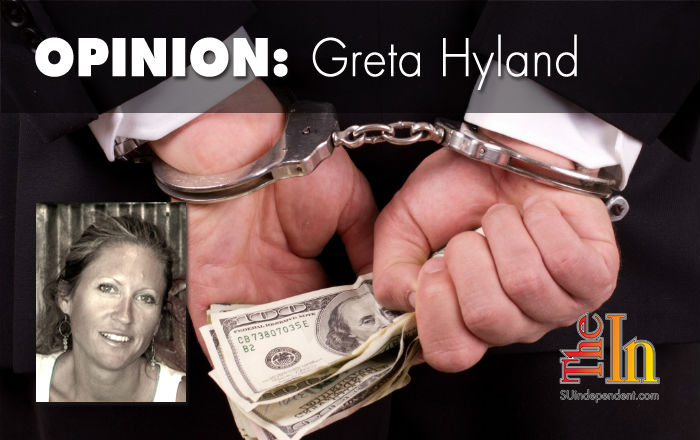OPINION: Utah’s white collar crime registry and finding justice in a court of law

Written by Greta Hyland
It was once said that justice is to the advantage of the strong. Looking at our legal system, it is hard to disagree. When the outcome is largely determined by who has the most money and the ability stay in the battle for as long as it takes, it hardly seems like justice. But then perhaps looking for justice in our legal system requires a deeper understanding of how it works.
Oliver Wendell Holmes Jr., a justice of the U.S. Supreme Court, was listening to the argument of a young lawyer who mentioned at several points in his argument that his client sought justice before the court. Justice Holmes listened as long as he could and then said not unkindly, “Young man, let me remind you that this is a court of law, not a court of justice.”
A little ironic that the judge is called a “justice” of the court.
But perhaps not.
Whenever I need clarity in understanding a word, I go to my trusty 30 pound 1930s Merriam Webster dictionary. For whatever reason, it seems that there was a time when brevity was not the rule of the day and people went the distance in trying to convey meaning. And though I won’t find a definition for twerking, the solid, foundational words of our language are all there.
The definition of justice is long and varied. It is much more nuanced and complicated than what I think we envision or reduce it down to. It is more than a western movie and the execution of justice by good guys against bad buys. The definition includes words like truth, righteousness, punishment, rights, laws, rewards, disputes, and impartiality.
But when it comes to disputes, the laws of the land are what determine justice. Laws are the rules of engagement in civic life. They are really meant to protect: protect one from bodily harm, protect assets, protect property, protect against…fill in the blank. The person with the law on their side, who can argue it better than the other side, will more than likely win, i.e., get justice. Ignorance of the law has never been a legitimate defense, which is why people with money have lawyers.
But not everyone can afford to keep a lawyer on retainer. This is where legislators come in and establish laws that are meant to be safety nets to protect as many as possible. Just recently Utah passed H.B. 378, The White Collar Crime Registry. This bill created a white collar registry that is much like the sex offender list. The bill came about after a man gave $86,000 to an acquaintance who promised a 25 percent return on his investment. His acquaintance disappeared after the money was given.
This is not an uncommon practice in Utah which has a very high fraud rate, and I think it is noteworthy and about time that the state is doing something about it. In the future, people who are asked to invest in anything can check the registry first to see if the person asking for money is on the list for committing white collar crime.
I applaud the state for doing something about white collar crime, but I still find it reprehensible that there are two classes of criminals, as if white collar crime isn’t as destructive as violent crime.
It is often joked that a man in a suit with a briefcase can rip you off faster than a man with a gun. After what happened on Wall Street, it’s hard to disagree. And furthermore, that none of those bankers, investors, etc., went to jail, even more clearly demonstrates how lacking our justice system actually is. That being said, if we want real justice under the law, we need to seek to have laws established that go after the powerful as well as the weak.
I’m not sure if this registry will actually get the real white collar criminals, but it is a step in the right direction. If legislators can create 500 bills in one legislative session ranging from cow sharing to marijuana legislation, then certainly our lawmakers can draft laws that protect average citizens from being taken by swindling white collar criminals, both nationally and locally, and from Wall Street to State Street.
If there are no laws against gambling with others’ savings, 401ks, or investments; no laws against professionals taking advantage of those who have placed their trust in them, then the law will always be on the side of the deceitful criminal who doesn’t look like one. And the unprotected will continue to meet the law rather than justice when they seek redress for the wrongs perpetrated against them.
Companies, banks, and special interest groups spend big bucks getting laws passed in their favor, we should be doing the same. Though we may not have the money, we do have the numbers – and numbers talk. Instead of waiting until legislation has been drafted to do something, we should go on the offensive and push for our own legislation – legislation that benefits and protects us. Then when we are seeking justice, we may just find it in a court of law.
Greta Hyland has a Masters degree in Environmental Policy & Management and has worked for the BLM and the NPS as well as for non-profit organizations. She is a regular contributor to the Utah Adventure Journal and is the Copy Editor at the Independent. She writes regularly on her blog about environmental policy issues affecting the southwest, as well as personal narratives about outdoor recreation and simple living. Her blog can be found at www.thesouthwestjournal.wordpress.com A Utah native, Greta is a consummate desert rat and loves exploring the southwest. She can be reached at [email protected]




